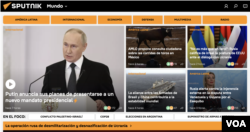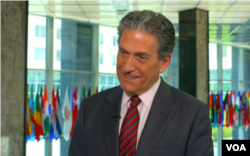Javier Vrox, the host of a political program on a YouTube channel in Chile who constantly monitors social networks in his country, recently noticed an uptick in pro-Russian political messaging, which had already been common in the country.
"They copy and paste the same messages on social media — that [Ukrainian President Volodymyr] Zelenskyy is an actor, that he is a funny president; they copy those videos of Zelensky's past TV series, making the point that he is an actor and a liar."
According to Vrox, such reports aim to convince Chileans that Ukrainians only pretend to be victims of Russian aggression but are themselves a regional threat, and that NATO and the United States, by that logic, are its partners and equally hostile to Chile while Russia is a reliable ally.
"I think they're doing a great job of tagging influencers, people from Twitter, now X, to share video messages and posts ... to create the idea that if you're a friend of the U.S., you're an enemy to Chile," said Vrox, who added that some posts referred to Ukrainian leaders as “Nazis,” even though Zelenskyy himself is Jewish.
These sentiments are not shared by Chilean President Gabriel Boric, who has publicly condemned Russian President Vladimir Putin for invading Ukraine and met with Zelenskyy in September 2023 during the U.N. General Assembly in New York to discuss a possible Ukraine-Latin America summit.
"Chileans don't really support Ukraine; they think that Ukrainians are trying to manipulate the media to look like victims," said Vrox. But “Boric supports Zelenskyy's government, so a weird situation has developed."
Well-funded network
James Rubin, the U.S. State Department’s Global Engagement Center special envoy and coordinator, agreed in an interview with VOA last month that Russia is “covertly co-opting local media and influencers to spread disinformation and propaganda” in Latin America.
In a public statement issued on November 7, the State Department said Russia "is currently financing an ongoing, well-funded disinformation campaign across Latin America," spanning at least 13 countries, from Argentina and Chile in the south all the way to Mexico in the north.
"A cultivated group of editorial staff would be organized in a Latin American country, most likely in Chile, with several local individuals and representatives — journalists and public opinion leaders — of various countries in the region," the statement said.
"A team in Russia would then create content and send the material to the editorial staff in Latin America for review, editing, and ultimately publication in local mass media."
Christopher Hernandez-Roy of the Washington-based Center for Strategic and International Studies, or CSIS, said Russia has a “legacy of propaganda” in the region going back to the Cold War.
Hernandez-Roy is a CSIS Americas Program deputy director and senior fellow.
The Soviets, he said, were "supporting revolutionary movements throughout the region, including military support in the case of Cuba, Nicaragua and other places, Central America in general, in the 70s and 80s."
The annexation of Crimea in 2014, he said, became the starting point of a new wave of disinformation in the region.
"It's around then that you start to see maybe an uptick in Russia's influence or trying to influence narratives in the Western Hemisphere," he told VOA. "In those three years — 2014, 2015 and 2016 — you start to see, for instance, 'Russia Today' coming online in Chile and Mexico, and I think in Argentina, as well."
According to an October report by the United States Institute of Peace, Actualidad RT (Russia Today in Spanish) and Sputnik Mundo are the key purveyors of Russian state media in the region. Hernandez-Roy said these two media organizations have about 32 million regular listeners in Latin America, which has 667 million inhabitants.
"So, [even] 30 million is quite significant, and those are [merely] the overt ways," he said. "Russia has a much more sophisticated apparatus than just simply its visible media outlets, [such as] using social media, sympathetic journalists, sympathetic influencers and Russian automated bots on social media. It can amplify its messages, which then are picked up by other sympathetic mechanisms."
"We know [Actualidad RT] have offices in Havana, Buenos Aires and Caracas," said Armando Daniel Armas, a Venezuelan opposition politician currently living in Europe. "We know that [Actualidad RT] have over 200 Spanish-speaking, let's say, journalists working in Moscow … who allocate resources to find professional people, good people with content" to perpetuate Russian narratives on the ground in Latin American.
The object, according to U.S. officials, is to have Russian public relations and internet companies recruit and cultivate Latin American journalists, influencers and public opinion leaders to seed their publications and broadcasts with content favorable to Moscow while hiding any links to the Kremlin.
“They've been somewhat successful in using RT and Sputnik in Latin America,” Rubin told VOA in November. “The difference here is they're trying to operate surreptitiously. They're trying to create content in Russia and launder it through Latin American journalists. They are covertly co-opting local media and influencers to spread disinformation and propaganda.”
U.S. officials said it is unclear how many of the journalists and opinion leaders are aware they are being fed Russian disinformation, although a senior State Department official told VOA, “There are definitely some willing participants.”
Others involved in the network may be sympathetic to the Russian viewpoints but unaware that the directions are coming from Moscow.
Russia's ultimate objective, said Hernandez-Roy, is to convince people in Latin America that Moscow is not the only one to blame — that there's blame on both sides in a war caused by the U.S. and NATO.
"Essentially, what they're trying to do is to make sure that the region is neutral,” said Hernandez-Roy. “We're not talking about Cuba, Nicaragua and Venezuela, which, of course, are completely on the Russian side."
Soft diplomacy
Yuriy Polyukhovych, Ukraine's ambassador to Colombia, Ecuador and Peru, points to another asset utilized to influence opinions in Latin American that Moscow has used since Soviet times: its diplomatic corps.
"Russian ambassadors, Russian embassies here are a part of Russia's propaganda machine,” he told VOA. “They've been doing their work for many years. These are not embassies of four or five persons. These embassies have 60, 70, 80 people each. Imagine what can be done with such a group of people! According to our information, some work for the intelligence service."
At the same time, said Ukrainian Ambassador to Argentina Yuriy Klymenko, the Russian war against Ukraine at least somewhat undermined Russia's standing in Latin America, presenting a diplomatic opportunity for the United States and its allies.
"From my experience, it is now considered bad manners to invite representatives of Russia to diplomatic or other public events," he told VOA.
Yuriy Polyukhovych once called Latin America a region of "contact diplomacy," emphasizing the need to work directly with local populations to counteract Russian influence. Hernandez-Roy suggested the U.S. project more soft power in the region.
"The U.S. used to project much more soft power decades ago than today,” he said. “Soft power means people-to-people exchanges, more high-level visits, cultural interchanges."
Kyiv, he said, should allocate more resources to the region and conduct active diplomacy with high-level visits and ambassadors to counter Russian narratives.
This story originated in VOA's Ukrainian Service. VOA National Security Correspondent Jeff Seldin contributed reporting.







